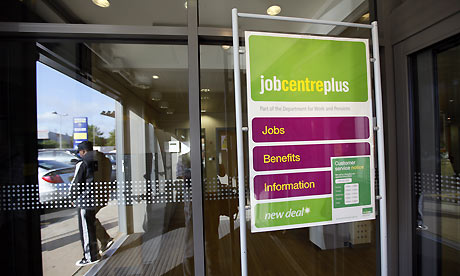Those claiming benefit increased to 1.6 million, the highest since May 1997

The jobless rate in Britain is nearly 8%. Photograph: David Sillitoe
Unemployment has jumped to its highest level since mid-1995, pushing the jobless rate in Britain up to nearly 8%, official data showed today.
The Office for National Statistics (ONS) said the jobless total on the broad International Labour Office measure rose by 210,000 in the three months to July, taking the total to 2.47 million. That rise was broadly in line with those of recent months and economists said there was little to suggest that the increases in unemployment were slowing.
The narrower claimant count measure, which only includes those claiming unemployment benefit, rose by 24,400 in August to 1.6 million, the highest since May 1997, and a rate of 5%, the worst since September of that year. That increase was also in line with those of the previous two months.
The ONS reported that average earnings growth slowed sharply to just 1.7% in the three months to July versus the same period last year, down from 2.5% in the three months to June.
TUC general secretary Brendan Barber said: "There are now over a million people out of work for more than six months, one in three of them under 25. There are no signs of recovery here.
"This is not the time to take risks with policies that could make unemployment worse. It might look rosier in city dealing rooms but out in the real world unemployment is the number one issue."
Catherine Matthews, a partner at licensed insolvency practitioners Tomlinsons, said: "With so many firms folding, the prospects of re-employment are proving increasingly slim for those that have been unfortunate enough to lose their jobs.
"The big problem for Britain's businesses, the reason why so many of them are going bust and laying off staff, is the banks aren't lending. The funding and financial support needed to survive just isn't there. It's what small and medium-sized business owners, and the accountants we work closely with, are saying to us day in, day out."
Economists were concerned about the slowdown in pay growth, which could prevent the economy recovering quickly from recession. Vicky Redwood at Capital Economics said: "As [Bank of England governor] Mervyn King highlighted yesterday, even if the recession is technically over, it will continue to feel like one for many people for a long time yet."
OECD sees 25 million unemployed
The Organisation for Economic Co-operation and Development also warned today that the recession could push unemployment across the developed world to a record high.
In its latest employment outlook report, the OECD predicted that the jobless rate across the world's 30 richest countries could come close to hitting 10% by the end of 2010. That would equate to 25 million people having lost their job in the downturn.
The OECD said that 15 million jobs had already been lost since the end of 2007, and called for more government action. "A major risk is that much of this large hike in unemployment becomes structural in nature," the Paris-based group warned.
"This unwelcome phenomenon occurred in a number of OECD countries in past recessions when unemployment remained at a new higher plateau compared with the pre-crisis level even after output returned to potential, and it took many years, if ever, to bring it down again to the pre-crisis level," it added.


0 comments:
Post a Comment